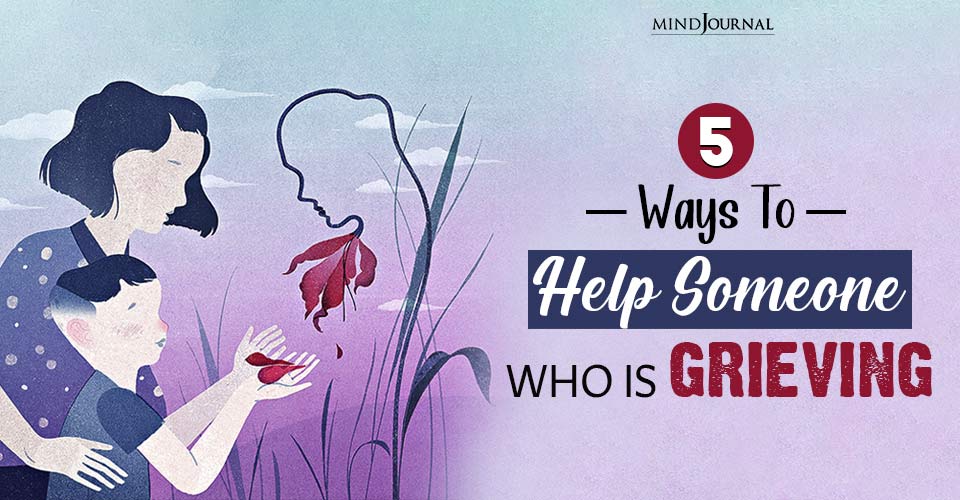Is a loved one dealing with loss? Wondering how you can support them through the grieving process? Let’s take a look at what you should say & how you can comfort someone dealing with loss.
Helping a loved one who’s grieving
Losing a loved one is one of the most difficult experiences as it completely changes who we are. So when someone we care about is coping with loss and grief, we often find it hard to comfort them.
We worry about saying the wrong things or not being able to help them. Hence we tend to hesitate about reaching out as we worry that we unintentionally make them feel even worse. This can be even more difficult if you haven’t personally experienced loss yet.
Related: 8 Things You Should Never Say To Someone Who Is Grieving
However, you need to understand that your support matters and can help someone dealing with loss, even though you may not be able to make their pain go away.
When supporting a grieving friend, feeling intimidated and anxious is common. This is why we often fail to find the right words and end up saying unhelpful or even hurtful things.
Even though we may worry about somehow hurting someone experiencing a loss, the support of family members and friends during such difficult times can make them feel loved and supported.
Supporting someone dealing with loss
Grieving after a loss can be a complex process of difficult and intense emotions. The bereaved may not only feel sad, but they may also be angry, feel guilty, and may even depressed. Moreover, they may also feel alone and isolated during the grieving process as others may not be able to fully understand their difficult emotions.
In a piece published in HelpGuide, authors Melinda Smith, M.A., Lawrence Robinson, and Jeanne Segal, Ph.D. write, “You may be afraid of intruding, saying the wrong thing, or making your loved one feel even worse at such a difficult time… But don’t let discomfort prevent you from reaching out to someone who is grieving. Now, more than ever, your loved one needs your support.”
Let’s find out how to help someone dealing with loss and how to support a grieving loved one.
Here are a few things you need to keep in mind when helping someone deal with loss:
- Do not worry about hurting them by saying wrong or hurtful things.
- Don’t let your worries prevent you from supporting your grieving loved one.
- Focus on offering them a comforting presence and a listening ear more than offering an answer.
- Realize that grief is a very personal experience and the process can take a long time.
- Be patient, be caring, and help in ways that offer practical solutions.

According to an article from Harvard Health Publishing, “It can be hard to know how to console a friend or relative who is grieving. If it seems that nothing you can do or say helps, don’t give up. You can’t take the pain away, but your presence is more important than it seems. Accept that you can’t fix the situation or make your friend or relative feel better. Instead, just be present and offer hope and a positive outlook toward the future.”
The article added, “Even small gestures—sending a card or flowers, delivering a meal, helping out with laundry or shopping, or making a regular date to listen and offer support—can be a huge source of comfort to a person who is grieving.”
Related: Grief Has No Expiration Date; You Don’t Need to Feel Guilty for Your Sadness
If you’re keen on helping your friend deal with loss, then it’s important that you reach out despite how you may feel about it. Your presence can mean a lot more to them right now than anything you can say to them.
In fact, more than any advice, they need your caring presence and support now more than ever to begin the healing process.
Ways to help someone cope with loss
Although there is no right thing to say to someone dealing with loss, there are some ways you can show your support and help in easing the grieving process.
How to help someone cope with loss? Here are 5 ways to support a grieving loved one:
1. Reach out
Make efforts to get in touch with a loved one when they lose a close friend or family member. Despite all your worries and anxieties, do not avoid them. Take the initiative to go and meet them or call them. Talk to them with the intention to understand them.
According to a post on Medium, “People experiencing loss are not generally proactive. They may be in a fog, they may have a hard time just coping with what has to be done. They may not even know what they need. They won’t themselves reach out, because grief is disabling.”
Right now they are confused and emotionally broken. As loss and grief can lead to depression, they may isolate themselves and shut themselves off. Hence, it is even more important that you reach out, not just once but repeatedly.
If visiting them personally on a regular basis is difficult, then you can call or even text to let them know you’re there.
Related: How To Deal With Grief: This Old Man Gave An Incredible Reply
2. Understand what to say
Now that we’re clear that you should reach out, it’s time to understand what you should say to them. Well, it turns out listening is more important than talking when it comes to supporting a grieving friend. Be a good listener and offer your comforting presence.
In a TIME magazine article, author Hoggart explains that we need to make space for them to express their feelings without necessarily interjecting.
She writes “We have such problem-solving attitudes in our society, but it’s unlikely that you can fix this situation. Without any magical thing to say to make it all better, just give them the space to express themselves and feel heard.”

However, it is also crucial to know what you can and should say. No matter how well-meaning your intentions are, stay away from fake positivity. Don’t try to change the topic when they mention the deceased person.
In fact, you should not be afraid to mention the deceased explains the Harvard Health post. It states “It won’t make your friend any sadder, although it may prompt tears… Saying how much you’ll miss the person is much better than the perfunctory, “I’m sorry for your loss.”
Moreover, make sure you only make promises that you can keep and let them know exactly how you can support them through this difficult time. Let your friend know how valued the deceased person was and what they meant to you. Be thoughtful and just be there for them.
“By being present and listening compassionately, you can take your cues from the grieving person. Simply being there and listening to them can be a huge source of comfort and healing,” explains HelpGuide.
3. Don’t give advice
How to help a friend dealing with loss?
As a friend or family member of someone dealing with loss, your role is to support them, not to provide answers.
Although you may be tempted to tell them what they should do, let them figure out their own way ahead. Grief is a very personal experience and everyone copes with it in their own way. It may take them a few months or even a few years to get over the profound sadness of the loss.
If you truly want to help them through the grieving process, acknowledge their emotions and tell them it’s okay to feel what they are feeling. Don’t try to minimize their emotions.
Related: The Different Ways We Cope with Loss and How to Handle It
In a HuffPost article, author and grief advocate Megan Devine explains “You have a supporting role, not the central role, in your friend’s grief. This may seem like a strange thing to say. So many of the suggestions, advice, and ‘help’ given to the griever tells them they should be doing this differently, or feeling differently than they do.”
She believes that grief “belongs entirely to the person experiencing it. You may believe you would do things differently if it had happened to you. We hope you do not get the chance to find out. This grief belongs to your friend: follow his or her lead.”
According to Harvard Health, “Unless you are asked for your advice, don’t be quick to offer it. Frequently, those who are grieving really wish others would just listen. It’s your understanding—not your advice—that is most sorely needed.”
Do not tell them how they should be managing their emotions and when they should move on. That is not your call to make. Instead, focus on acknowledging their grief and their emotional pain. Agreeing that things are difficult right now would let someone dealing with loss feel a lot more supported and heard.
4. Provide practical support
If you truly want to help someone through the grieving process, then offer practical help and support. As the grieving person is already dealing with loss, they might need some help doing certain things and going through daily life. So, what to say to someone who is dealing with loss?
Instead of simply saying “Let me know if you need anything,” simply show up and suggest exactly what you can help with. Ask them if they need something from the grocery store or invite them over for dinner.
In the HelpGuide article, Melinda Smith, M.A., and her associates explain “If you’re able, try to be consistent in your offers of assistance. The grieving person will know that you’ll be there for as long as it takes and can look forward to your attentiveness without having to make the additional effort of asking again and again.”
Related: Understanding Disenfranchised Grief: When No One Understands Your Loss
Author Megan Devine believes you can also help with the tasks related to the funeral arrangements. She says “There may be difficult tasks that need tending – things like casket shopping, mortuary visits, the packing and sorting of rooms or houses. Offer your assistance and follow through with your offers. Follow your friend’s lead in these tasks. Your presence alongside them is powerful and important; words are often unnecessary.”
According to Harvard Health, simply asking to help can make your loved one feel burdened. “Instead, be specific when offering help. Bring dinner over, pass on information about funeral arrangements, or answer the phone…Sometimes your help is most valuable later,” it adds.
Here are some ways to offer practical support:
- Running errands and doing chores.
- Shopping for groceries.
- Bringing over some food or dinner.
- Helping with paying bills and filling up important documents.
- Looking after their children and pets.
- Accompanying them whenever you can.
- Offering to take them out to a movie or a dinner.
- Doing some fun activities like playing sports, games, or creative projects.
5. Be patient and offer constant support
During the initial days of dealing with loss, your loved one will have most of their family and friends available offering their help, support, and love. However, as the days will go by, everyone will eventually start focusing more on their own lives and become less available.
Unfortunately, there is no time limit on loss, grief, and sadness. Someone dealing with loss may need your support even months or years after the funeral. So be patient and make sure to be there for them for a long time.
“Stay in touch with the grieving person, periodically checking in, dropping by, or sending letters or cards. Once the funeral is over and the other mourners are gone, and the initial shock of the loss has worn off, your support is more valuable than ever,” write authors Melinda Smith, M.A., Lawrence Robinson, and Jeanne Segal, Ph.D. on HelpGuide.
Related: Models Of Grief: Ways To Cope With Loss and Minimize The Pain
Although the bereaved individual may appear strong and fine to you, they may still be suffering internally. The truth is bereavement is never easy. Yes, they will eventually learn to accept the loss, but the pain may never fade completely. So make sure to show them your love and support without hesitation.

Things to keep in mind
Here are some dos and don’ts that you need to remember while helping someone dealing with loss.
Do’s:
- Acknowledge the situation.
- Ask them how they are feeling.
- Allow them to express their feelings.
- Get comfortable with witnessing unbearable pain.
- Accept their anger, irritation, and mood swings.
- Be compassionate, show empathy & try to understand their feelings.
- Be genuine and sensitive in your communication.
- Express your concerns honestly.
- Help them connect with support groups or others in similar situations.
- Encourage them to take a break.
- Note down special dates like birthdays & anniversaries and be present on those dates.
- Remind them to take care of themselves like eating and sleeping properly.
- Watch out for signs of depression or suicidal behavior.
- Take them for counseling if necessary.
- Stay connected & be available.
- Express your love, care, and support for them.
Related: The Transformational Effects of Bereavement: How Grief Can Lead To Spiritual Growth
Don’t’s
- Don’t try to fix their problem.
- Don’t attempt to explain the event or their loss.
- Don’t try to minimize the loss.
- Don’t expect them to reach out and ask for help.
- Don’t say things like “(I know how you feel)” unless you’ve experienced loss personally.
- Don’t stop them from crying as it can be a cathartic experience.
- Don’t be afraid of sitting with them in complete silence.
- Don’t judge them for how they are dealing with loss.
- Don’t make their loss about religion or your religious beliefs.
- Don’t take their mood swings personally. It’s not about you.
Reach out and help them heal

Although the tips above will guide you to help someone cope with loss and grief, there is no magical solution to it as every individual deals with loss in their own unique way. However, these tips mentioned here will certainly help you get started in the right direction.
Simply follow your heart and be present for them as a friend. It’s okay if you don’t have the answers. They are not looking for answers right now. They are simply trying to accept their loss and trying to figure out how to move forward in life without their deceased loved one.
Related: How To Deal With Death and Dying As You Age
Losing a loved one can completely change your life. However, having a friend by the side can make things a bit easier. So don’t worry about doing the wrong things and simply trust your instincts.











Leave a Reply